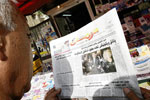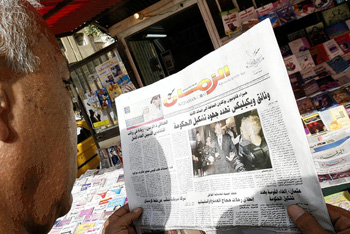 Wall Street Journal: The classified U.S. documents released over the weekend—including graphic depictions of torture at the hands of the Iraqi security services—have roiled the already-tense political situation in Iraq, as political parties struggle to form a new government.
Wall Street Journal: The classified U.S. documents released over the weekend—including graphic depictions of torture at the hands of the Iraqi security services—have roiled the already-tense political situation in Iraq, as political parties struggle to form a new government.
The Wall Street Journal
By MARGARET COKER And BEN LANDO
 The classified U.S. documents released over the weekend—including graphic depictions of torture at the hands of the Iraqi security services—have roiled the already-tense political situation in Iraq, as political parties struggle to form a new government.
The classified U.S. documents released over the weekend—including graphic depictions of torture at the hands of the Iraqi security services—have roiled the already-tense political situation in Iraq, as political parties struggle to form a new government.
Prime Minister Nouri al-Maliki has been trying to cobble together a governing coalition since an inconclusive parliamentary vote in March. Yet Mr. Maliki’s critics—who have long alleged that security forces under his command target political rivals, in particular, rival Sunni supporters—are using the cache of nearly 400,000 classified documents as fuel to keep him from another term.
There has been no evidence found in the documents that Mr. Maliki was aware of the grisly acts of torture and beatings. However, the timing of the documents’ release comes just as his Shiite bloc, known as State of Law, has made gains in securing the majority of parliamentary seats needed to form a new government. As prime minister, Mr. Maliki was commander-in-chief of the Iraqi forces during from the 2006 to 2009 period covered in the leaked papers.
Mr. Maliki is wrestling for seats with former Prime Minister Ayad Allawi and his largely Sunni bloc, known as Iraqiya, in coalition negotiations with Iraq’s other smaller parties. In a sign of growing frustration over the seven-month impasse over the new government, Iraq’s highest court on Sunday ordered parliament back to work, calling the delay unconstitutional.
The four-page court order called “illegal” a June decision by lawmakers to delay parliament’s return and give leaders time to broker political alliances. Parliamentarians, including the acting speaker, Fouad Massoum, say they expect to have a meeting date set this week. It is unclear whether the court order will spur parliamentarians to meet for more than a perfunctory session.
Mr. Maliki’s office criticized the leaks as politically motivated and designed to damage his reputation. In a statement, his office defended the action of security forces in the wake of the documents’ release by the website WikiLeaks. “We assure that the security apparatus of the prime minister, as the commander in chief of Iraqi armed forces, only make arrests when there are warrants issued against those people by the judiciary and special bodies, but not on a sectarian or partisan basis, as some of the parties or groups want to say,” the statement said.
The spokesman for the Iraqiya bloc headed by Mr. Allawi, who narrowly beat Mr. Maliki in the March polls, called for two separate investigations of the leaked documents to determine whether “war crimes” had occurred in the episodes described in the documents. Haider Mulla said his bloc would push to have one investigation into whether alleged unlawful acts of abuse by Iraqi forces took place, and another to determine whether Iran violated Iraqi sovereignty.
Iraqiya members over the weekend said the allegations in the documents show that Mr. Maliki isn’t the right person to usher Iraq beyond its bloody sectarian recent history. Mr. Allawi, as former prime minister, was commander in chief from 2004 to 2005, when U.S.-led forces still controlled the country.
Nearly 400,000 classified U.S. documents, released by WikiLeaks late Friday, include field reports detailing torture and the use of inappropriate and extrajudicial action against prisoners by Iraqi forces, according to accounts of the documents in a handful of media outlets that were given access to them ahead of their public release.
The documents don’t appear to provide any significant new revelations about Iraqi abuse. American commanders have long acknowledged instances of such abuse, and they have said they have tried to prevent it when they found it.
The U.S. also has acknowledged abuse of prisoners at its own facilities, most notable at Abu Ghraib prison, and have prosecuted soldiers allegedly involved.A U.S. Defense Department review of the documents found the number of abuse incidents by Iraqi forces declined as the war went on, according to Pentagon officials. The Wall Street Journal wasn’t among the outlets given early access to the documents.
The documents contain graphic depictions of frequent cases of Iraqis abusing their detainees with various weapons and electric shocks, according to the outlets reviewing them.


